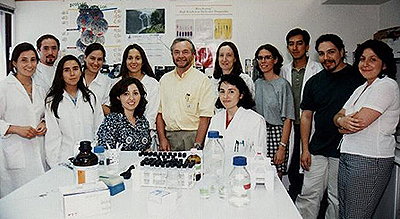
English Version
Research
 |
The group of Dr. J.A. Asenjo and associate investigator Dr. B. Andrews use a systems biology approach that includes metabolic engineering and metabolic flux analysis to optimize the synthesis of recombinant proteins in yeast cells. These studies allow the analysis and optimization of all the metabolic fluxes involved in a cell during the synthesis of a recombinant protein. The comparison of these cells with cells without plasmid using DNA Microarray technology is currently underway. |
"Members of the group of Drs. Asenjo and Andrews in the Protein Purification and Characterization Laboratory" |
|
Proteins can now be cloned, expressed, purified, sequenced and characterized and, even more amazingly, dramatically improved in their abilities. In the group we are using site-directed mutagenesis to introduce specific changes in such proteins to adapt them for clinical and industrial applications, using PCR technique, molecular modelling and computational and bioinformatic studies. In addition, random mutagenesis is being carried out using error-prone PCR (that consists of analyzing a few thousand mutants with only one aminoacid mutation) and gene shuffling to carry out the accelerated evolution of these enzymes. As well as a lytic glucanase, cryophilic proteases and lipases of antartic of marine origin are being studied. A more recent line of research studies the critical factors for the mass culture of sustancia nigra cells for transplant and the isolation, and purification of factors with transforming activity for immortalizing animal cell cultures. In collaboration with the Gene Therapy laboratory of the Institute, the group investigates the rational design, production and purification of third generation gutless vectors for Gene Therapy. Other projects include the study of factors that affect the production and purification of plasmids, the differentiation of Stem Cells (with T. Papoutsakis from Northwestern University), the factors that affect protein partition in liquid-liquid extraction (hydrophobicity, charge), mathematical modelling and optimization of chromatography for protein purification (including a study of the effect of hydrophobicity), the use of Mathematical Models to describe metabolic networks and gene regulation of metabolism and Process Synthesis for protein production using computer methods. |
|